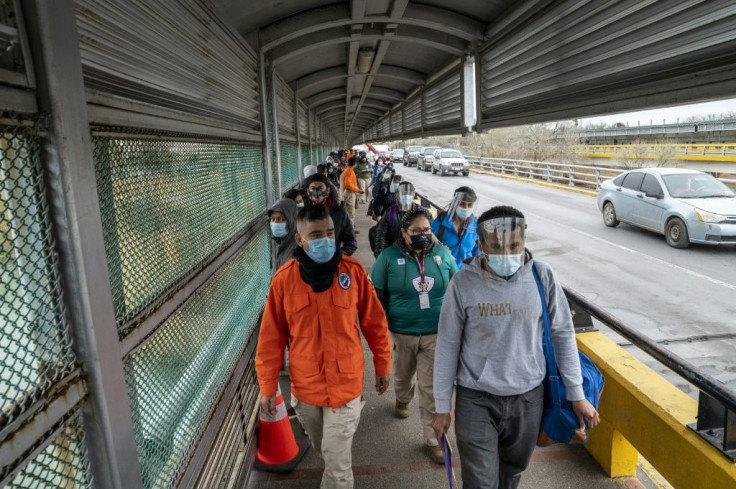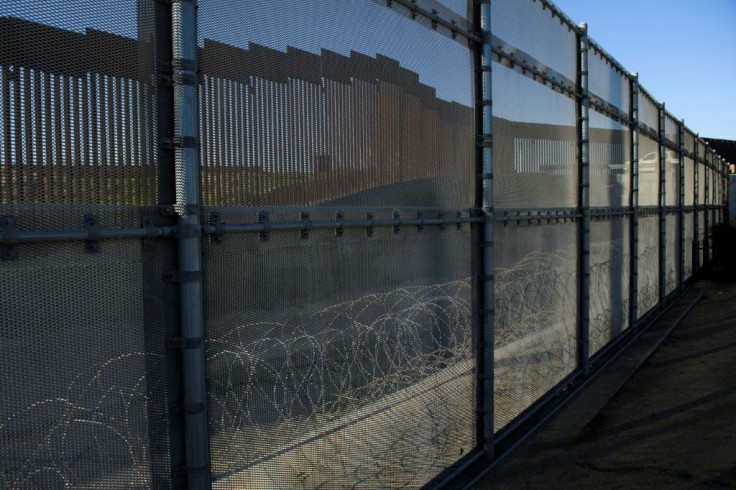Biden's Immigration Policy Takes Heat As Migrant Levels Soar
President Joe Biden faced mounting pressure Monday from Republicans over his handling of a surge in migrants -- including thousands of unaccompanied children -- arriving at the US-Mexican border.
While successive administrations have dealt with seasonal spikes in migration, Biden's critics claim he has driven the latest uptick by taking a softer stance on the flashpoint issue than his predecessor Donald Trump.
On January 20, his first day in office, Biden scrapped several of Trump's contentious immigration policies, including halting new construction of a border wall and proposing legislation to create a citizenship pathway for the nearly 11 million people living illegally in the US.
Republican congressman Kevin McCarthy of California, who leads his party in the House of Representatives, described Biden's policies as having created "more than a crisis."
"You can continue to deny it but the only way to solve it is to first admit what he has done, and if he will not reverse action, it takes Congressional action to do it," McCarthy told a press conference on the border in the Texas town of El Paso.
Republican congressman Chuck Fleischmann said Biden's administration had "created an environment" that caused an increase in migration. Other Republican lawmakers said human traffickers were profiting from Biden's policies.
White House spokeswoman Jen Psaki said Biden had inherited "a dismantled and unworkable system" from Trump.
"Like any other problem, we're going to do everything we can to solve it," she said.

At a bus terminal in the border town of Brownsville late Sunday, a Guatemalan woman told AFP she had crossed the border illegally after her husband, who is already in the US, told her things may be simpler under Biden.
"My husband told me to come at this time," said Rubia Tabora, a 25-year-old mother of one.
"At home there are no jobs, no money."
In February, the US Customs and Border Protection agency (CBP) arrested about 100,000 people at the southern border -- including nearly 9,500 unaccompanied children -- a 28 percent jump over January.
In line with a pandemic-rooted policy adopted by Trump, who cracked down on immigration both legal and illegal as part of his "America First" doctrine, the Biden administration is deporting most of the undocumented people who arrive at the southern border.
But unlike Trump, Biden has opted against expelling minors who show up unaccompanied and are filling shelters set up to hold them, with limited capacity because of the coronavirus crisis.
Still, Brownsville mayor Trey Mendez said authorities in his community at the southern tip of Texas were not overwhelmed.

"I don't feel that it's a crisis for the city of Brownsville," he told reporters.
He said about 150 migrants daily are processed in the city, most of whom leave within 24 hours.
The Biden administration over the weekend ordered the Federal Emergency Management Agency (FEMA) to support an effort to temporarily house thousands of children who crossed the US-Mexico border alone.
While detained migrant adults and families continue to be sent back to Mexico, unaccompanied children are being processed and then get help resettling with US relatives.
Dallas County commissioner J.J. Koch said that FEMA had asked the city to lease them a hall at the Kay Bailey Hutchison Convention Center as a "decompression center" to house up to 3,000 teenage boys aged between 15 and 17 for as long as 90 days, "while plans for more permanent sheltering or connection to sponsor families can be arranged."
He said FEMA "desires to begin operations as early as this week."
Homeland Security Secretary Alejandro Mayorkas said Saturday that numbers of unaccompanied child migrants had reached "record" levels, but dated the surge back to April 2020 and blamed ongoing violence, natural disasters, food insecurity and poverty in parts of Central America.
The US Department of Health and Human Services is currently holding about 8,800 migrant children.
A local activist told AFP about 200 migrants in family groups traveled on from the Brownsville bus terminal on Saturday, after receiving Covid-19 tests.
Such scenes are being repeated at towns along the vast border that spans four US states.
Most in Brownsville had turned themselves in after crossing the frontier and were given paperwork requiring them to report to immigration authorities later on.
Chris Cabrera, a spokesman for a local Border Patrol union in Texas's Rio Grande Valley, told CNN that immigration numbers often surge around the time of an election or new presidency.
"A part of it is every election cycle, regardless of the political party that takes office. It gets interpreted in the southern countries a little different," he said.
The US Congress is this week considering two immigration bills.
One of them would grant several categories of migrants, including people brought to the country as children -- so-called "Dreamers" -- an immediate path to permanent residence.
© Copyright AFP 2024. All rights reserved.





















